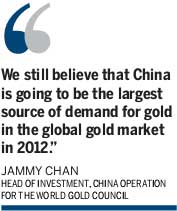
Country's holdings of US Treasury bonds stand at $1.16 trillion at the end of June
The Chinese are not eager to buy gold as the price of the metal stagnates and the country's GDP grows at a slower pace, according to a report issued by the World Gold Council on Thursday.
In China, the amount of gold jewelry sold in the second quarter of 2012 decreased by 9 percent year-on-year to 93.8 metric tons, the report said. The jewelry's value meanwhile decreased at a gentler rate, going down 6 percent year-on-year to 30.7 billion yuan ($4.82 billion).
 |
|
A saleswoman arranges jewelry at a shop in Qionghai, Hainan province. The World Gold Council said on Aug 16, 2012 that global gold purchases dropped 7 percent year-on-year in the second quarter, and predicted that China will be the biggest source of gold demand this year. [Photo / China Daily] |
That was still 17 percent greater than the average quarterly value of 26.4 billion yuan that the sales showed during the past five years.
Also in the second quarter, 51.1 tons of gold were bought for investment purposes, an amount down 4 percent year-on-year. The report said a lack of direction in gold prices was leading Chinese investors to think twice about buying the metal.
It said the Chinese often buy gold jewelry only when the price of such goods is showing a definite trend.
The second quarter of 2012 also saw the amount of gold purchased globally decrease by 7 percent year-on-year and by 10 percent from the previous quarter. The lack of a clear price trend has prompted various responses from buyers around the world.
Amid the eurozone's ongoing sovereign debt crisis, European investors, for one, have kept their conviction that they can safely preserve capital by putting it into gold, the report said.
And retail investors bought 77.6 tons of gold in the quarter, up 15 percent year-on-year. That was 19 percent higher than the 65.2 tons they had bought every quarter on average in the past five years.
Also in the quarter, official institutions bought 157.5 tons of gold, a record amount and more than double what they had purchased in the same period a year ago. Altogether, they were responsible for 16 percent of global gold purchases during the period.
Among the central banks that bolstered their holdings in the second quarter were the National Bank of Kazakhstan, and the central banks of the Philippines, Russia and Ukraine.
"Gold's performance reflects the continuing challenging economic climate," said Marcus Grubb, managing director of investment at the World Gold Council. "A softness in India and China, who between them represent over 45 percent of the total second quarter jewelry and investment demand, accounts for much of the slowing of global gold demand."
However, through all the uncertainty, it is clear that gold's fundamental properties as a vehicle for capital preservation and a source of liquidity continue to endure. This is evident from the activity of central banks, the ultimate long-term investors, which continue to increase their gold holdings to diversify reserves and protect against reliance on one or more foreign currencies."
Official institutions meanwhile bought 157.5 tons of gold during the quarter. That was the highest amount seen in a quarterly period since such institutions began reporting their net purchases in 2009. It was also more than double the 66.2 tons of gold that were purchased in the same period a year ago.
Central banks, for their part, have been parting with little of the metal. In June, Germany sold 0.7 ton of gold for the purpose of having it minted into commemorative coins.
 |
China, the largest foreign holder of US Treasury bonds, added $300 million to its holdings between May and June to bring the total to $1.16 trillion, the US Department of Treasury said on Wednesday.
"I can't disclose how much gold is held in reserve by China's central bank, which keeps that information confidential," said Jammy Chan, head of investment, China operation for the World Gold Council. "But I can tell that decision-makers are working to promote the gold trade in China and are pushing for the establishment of a more open gold market in the country."
Even if China's central bank does not have as much gold in reserve as other countries, individual investors and institutional investors in China may decide to increase their holdings of the metal to diversify their assets, said Chan.
The second quarter of 2012 has been tough for both China's gold market and the global gold market. Chan said Chinese investors apparently think that now is not the right time to buy more of the metal.
"We still believe that China is going to be the largest source of demand for gold in the global gold market in 2012," Chan said.
Contact the writer at wuyiyao@chinadaily.com.cn
China's domestic gold market
China's gold demand down 7% in Q2
Gold loses luster in domestic market
Gold rises on Chinese easing expectations
Gold-trading ring took in billions
China's gold output growth slows
Mainland buys more HK gold